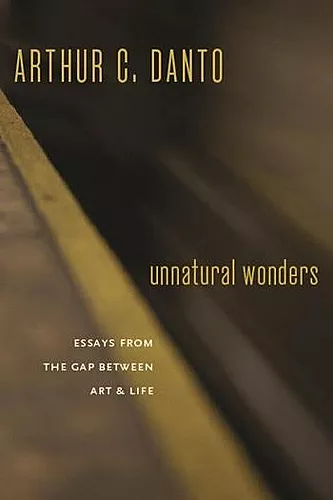Unnatural Wonders
Essays from the Gap Between Art and Life
Format:Paperback
Publisher:Columbia University Press
Published:23rd Oct '07
Currently unavailable, and unfortunately no date known when it will be back

The famous theorist locates contemporary art's most exhilarating achievements.
Argues that aesthetic considerations no longer play a central role in the experience and critique of art. Instead art addresses us in our humanity, as men and women who seek meaning in the "unnatural wonders" of art, a meaning that philosophy and religion are unable to provide.Arthur C. Danto's essays not only critique bodies of work but reflect upon art's conceptual evolution as well, drawing for the reader a kind of "philosophical map" indicating how art and the criteria for judging it has changed over the twentieth century. In Unnatural Wonders the renowned critic finds himself at a point when contemporary art has become wholly pluralistic, even chaotic-with one medium as good as another-and when the moment for the "next thing" has already passed. So the theorist goes in search of contemporary art's most exhilarating achievements, work that bridges the gap between art and life, which, he argues, is now the definitive art of our time. Danto considers the work of such young artists as John Currin and Renee Cox and older living masters including Gerhard Richter and Sol LeWitt. He discusses artists of the New York School, like Philip Guston and Joan Mitchell, and international talents, such as the South African William Kentridge. Danto conducts a frank analysis of Matthew Barney's The Cremaster Cycle, Damien Hirst's skeletons and anatomical models, and Barbara Kruger's tchotchke-ready slogans; finds the ghost of Henry James in the work of Barnett Newman; and muses on recent Whitney Biennials and art influenced by 9/11. He argues that aesthetic considerations no longer play a central role in the experience and critique of art. Instead art addresses us in our humanity, as men and women who seek meaning in the "unnatural wonders" of art, a meaning that philosophy and religion are unable to provide.
Borrowing his concept from Hegel, respected critic Arthur C. Danto observes that unlike the centuries of art made for spiritual needs, the art of our time has generally lost the power to communicate on its own and must be explained, because we have only an external relationship with it. Danto sympathetically assesses Damien Hirst (sliced-up sharks suspended in formaldehyde) and eloquently explains why some initially impenetrable art might have compelling statements to make, but he doesn't spare artists he feels are not pulling their weight... among the most sensible, intelligent, logical, and accessible art criticism of the last five years. Kirkus Danto uses his revered position to illuminate his subjects' cultural and art-historical contexts in order to give the public helpful tools for thinking about the art they are experiencing... This enlightened collection of essays is an essential documentation of recent art history, brimming with valuable reminders of how art has gotten where it is today. RES magazine His musings on art in the wake of 9/11 are incisive and moving. Booklist A welcome respite for insiders and a friendly introduction to aesthetics. Publishers Weekly One of our pre-eminent art critics... [Unnatural Wonders] serves as a good introduction to his work, as well as a good introduction to contemporary art. -- Kenny Tanemure Asian Week To look at a work with Danto is to see it within the context of contemporary art. -- Barry Gewen New York Times Book Review [A] brilliant, provocative collection of essays. -- Jackie Wullschlager Financial Times Magazine A valuable collection of art criticism. The Art Book
ISBN: 9780231141154
Dimensions: unknown
Weight: unknown
408 pages